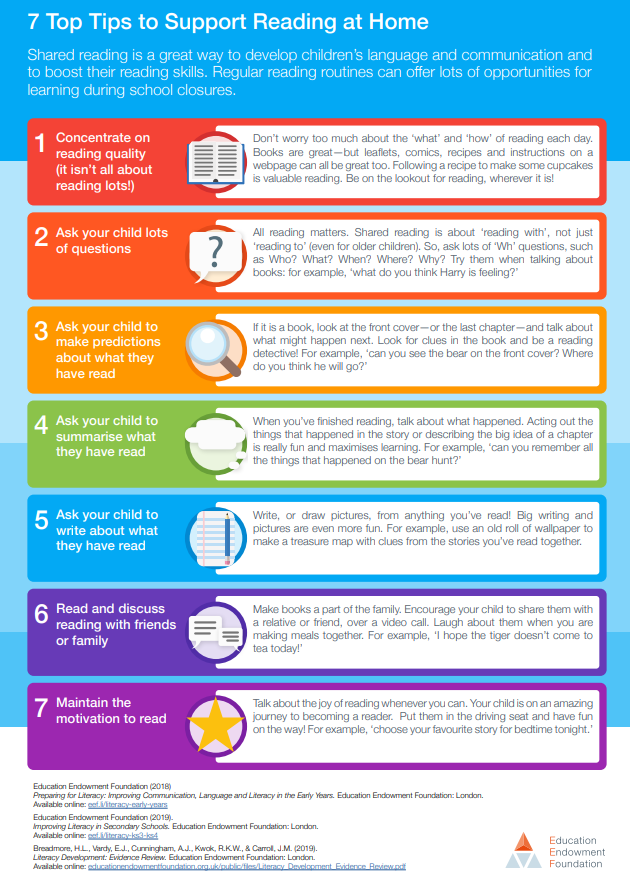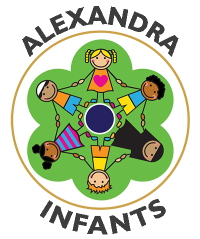Early Reading at Alexandra Infants’ School
Reading
Becoming a fluent, skilled and attentive reader starts at the earliest stages and there is very strong evidence that reading is fundamental to children’s success at school and in their lives beyond school. At Alexandra Infants’ School we believe that it is important to teach our children the necessary skills as soon as they join us. In nursery early phonics is embedded to ensure that children have the skills ready for Reception where they are taught systematically to read. We believe children who become fluent readers as soon as possible will learn more, as they can read and gain knowledge for themselves. We want to give our children a good foundation by building their phonic knowledge and reading skills. Reading for pleasure is also given a high priority. It is recognised that children who read for pleasure improve their life chances, not just in education, but in mental well-being and social relationships. At Alexandra Infants’ School, we ensure children have the opportunity to hear, share and discuss a wide range of high-quality books, as part of the curriculum and beyond, to develop a love of reading and broaden their vocabulary. We want all children, regardless of background, to read early, build on their success and become confident, independent readers.
Click here to see our Approach to Early Reading
Reading Subject Leader Promise
My name is Miss Thompson and I am the Early Reading Lead at Alexandra Infants’ School. I am passionate about reading and ensuring that every child has the necessary skills to read confidently and fluently.
Our reading curriculum has been designed so that our children get the opportunity to hear and experience a range of stories and non-fiction texts throughout their time in school. Early reading and reading for pleasure is centred around quality texts and these are woven throughout our curriculum as soon as the children enter EYFS. Children explore a range of texts, both in English lessons and during dedicated story time. Texts selected for story times come from Pie Corbett’s reading spine, Stoke 100’s must reads and books that match the curriculum.
Phonics
At Alexandra Infants’ School, we have chosen to utilise ANIMA PHONICS which is a DFE approved systematic, synthetic phonic approved scheme that engages children in phonics and reading. Teachers’ monitor pupils’ progress daily to ensure that they keep up. Children practice reading lively phonics books consistent with their developing phonic knowledge and skill and their knowledge of common exception words. Reading and re-reading these books with the teacher supports their increasingly fluent decoding.
Every child has a fully decodable phonics book to take home until they are assessed as confident readers, they then use books from accelerated reader. This allows children to select from an extensive range of literature and ensure that they are reading texts which will challenge them and further develop their fluency and comprehension skills. It will also help them to prepare for their transition to junior school.
To ensure our children read fluently we:
- Teach the phonological skills to decode texts in our daily phonics lessons using ANIMA PHONICS (DFE approved SSP) from Reception to Y2.
- Assess children’s phonics knowledge daily in lessons to ensure those pupils at risk of falling behind are given additional support. In addition to this we check half termly progress from a child’s starting point.
- Ensure that, whilst children are learning to read, they read books carefully matched to their developing phonic knowledge.
- Teach the key skills for reading, learning sounds, learning letter recognition, blending, segmenting, and remembering non decodable words, reading with fluency and expression.
- Ensure that through our reading squad all children are read with in a small group daily and that teachers and teaching assistants are aware of the children in their class that are making the slowest progress are given additional practice.
- Carefully plan the English learning journey so that children are exposed to a range of key texts that support their child in developing their reading journey.
Phonics and Grammar expectations
Guided Reading
These are a half hour sessions delivered by our ‘Reading Squad’ from Reception (when appropriate) to Y2. This squad approach ensures that all children have an adult for every session with a particular focus on fluency and a key reading skill. Once children have learned to decode accurately and fluently they then access whole class guided reading.
As part of our pedagogy in reading we utilise different types of reading such as:
- Teacher modelling
- Echo reading
- Choral reading
- Paired reading
- Independent reading aloud and to self.
Pupils in nursery who are assessed as being ready for a reading book with words, read daily on a 1:1 basis with their key worker.
Reading for pleasure
At Alexandra Infants’ School each class experiences a different author on a half termly basis, so that all children can talk about what type of stories they like and why they like the stories they have chosen.
- Julia Donaldson
- Eric Carle
- Claire Freedman
- Oliver Jeffers
- Rachel Bright
- Giles Andrea
Alongside these chosen authors we also ensure that our story time books reflect the diverse context of our school and allow our children to experience books that create mirrors and windows; books that allow our children to see themselves represented and books that bring visibility to experiences and cultures that children have not yet encountered.
Other exciting events take place throughout the year such as parents workshops linked to reading, Booktrust visits, visits to the local library, book fairs and world book day activities. We recognise that these experiences in EYFS and KS1 are integral to developing children’s reading success as they prepare for KS2.

